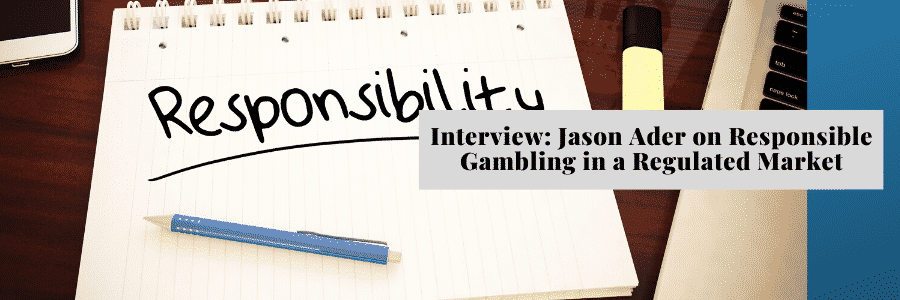Exclusive Interview: Jason Ader on Regulating Responsible Gambling

The ongoing rollout of sports betting and online gambling legislation across the country is already resulting in some eyebrow-raising revenue figures from some states. Despite increased access to legal gambling options and a strengthening domestic market, Americans still have access to illegal offshore gambling options that lack financial and responsibility safeguards.
The industry now faces the balancing act of allowing operators to be competitive against their unregulated offshore competitors while also promoting responsible gambling. US regulators have so far taken a light touch approach to problem gambling requirements, but as we’ve seen in the UK and other markets, all it takes are a handful of mistakes and the wrong kind of media coverage to turn the tide against the industry.
Jason Ader Q&A: Supporting a Competitive but Responsible Industry
That story does not have to repeat in the US, according to Jason Ader, Co-Founder and CEO of SpringOwl Asset Management, if operators and regulators get ahead of the issue and take advantage of emerging responsible gambling technology.
Jason Ader is intimately familiar with land-based and online gaming markets around the world as an independent sponsor who is deeply involved in the gaming industry. Some of his more visible turnaround successes involve the Las Vegas Sands Corp, IGT, Bwin, The Stars Group and now with Playtech.
Operators, lawmakers and the industry as a whole are moving toward solving the issue of offshore gambling as a growing number of states pass online gaming and sports betting legislation. Still, illegal gambling will continue to lurk in the background, ready to fill in the void for customers in states that don’t legalize or that overregulate.
BettingUSA was able to speak with Mr. Ader to get his take on the current state of the regulated online gambling industry and its efforts to channel customers away from illegal offshore operators while also promoting responsible gambling.
Overregulation and Unintended Consequences
During our talk, Jason Ader was very clear that responsible gambling should be taken seriously. Just like regulators, the industry itself desires an environment in which bettors participate for fun and to enhance the gameday experience.
However, overregulation can be counterproductive. Push too hard and limit gamblers too much, and they will eventually look to other, non-regulated options.
BUSA: As some other markets continually impose new advertising and operating restrictions on licensed betting operators, do we eventually get to a point where too much regulation becomes counterproductive?
Jason Ader: “The unintended consequence of overregulation – such as cutting betting limits – is that people are not going to bet based on what the UK limit is; they’re going to bet what they want to bet. So, to put a $2 limit on a bet on sports is just going to push those that live in the UK or England specifically to offshore alternatives. The problem with offshore alternatives is there’s no regulations; it’s a complete black market. You have no idea who’s on the other side of the bet. You have no way of controlling problem gambling, underage gambling. And so that ends up making matters worse.”
“My only view is that everything should be done to prevent compulsive gambling, problem gambling and underage gambling, but there are a lot of constructive solutions to balance out the desire of people to pursue gaming as a leisure activity and the leagues to promote proper and responsible engagement among the fans.”
Getting Ahead of the Issue
BUSA: UK gambling operators now face an increasingly hostile regulatory environment with tightening advertising restrictions, lower betting limits and more. What should US operators be doing to get ahead of problem gambling and to avoid getting on the wrong side of regulators?
Jason Ader indicated US operators can get ahead of problem gambling with the use of technology and tools. He pointed to Playtech’s own responsible gambling tool, BetBuddy, which makes extensive use of data gathering and AI to identify, manage and communicate with high-risk players.
Jason Ader: “I would really encourage politicians who are thinking about overregulating to really think hard about whether it’s really going to stop… people from betting on big sporting events and playing online.
“So why not use technology in 2020 to deal with the issues of concern and stay in control of the customer and regulate and tax what could be a very healthy leader industry, not an industry that is problematic to consumers?”
Domestic Operators Versus International Gaming Giants
While we had Jason Ader’s attention, we also took the opportunity to switch the subject a bit and ask about his thoughts on the developing US market.
BUSA: How do you think the newer domestic operators will fare over the long term in the US market against the bigger, more experienced international operators that have also established stateside operations?
Jason Ader: “The US is still in the early days, but the technology in Europe is proven, it’s scaled, it’s cross-border. I think in the US right now what we’re really dealing with is very, very small sort of micro markets that are not cross-border. A lot of the US companies that have access also have licenses to use essentially the same technology either from the European companies or they have partnerships with the European gaming companies…
“But we’re barely out of the starting gate in the US as it is. I think the companies like Caesars and Rush Street that have moved quickly into this area have perfectly good technology, but it hasn’t yet been tested with scale the way you would see with GVC or William Hill or Playtech.”







